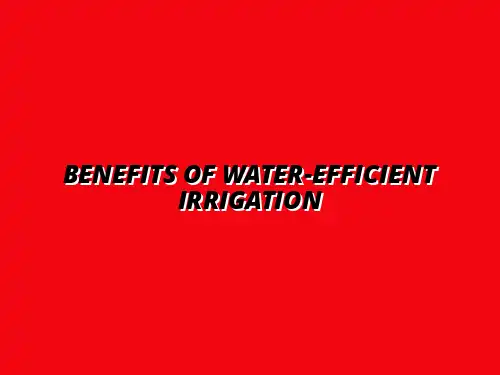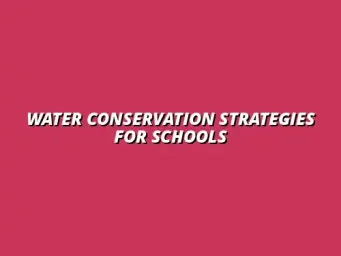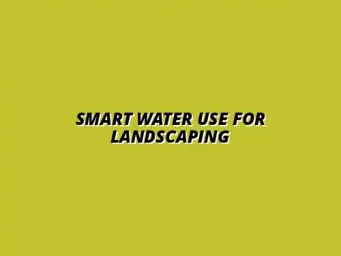Understanding the Significance of Water-Efficient Irrigation Systems
Water-efficient irrigation systems play a crucial role in modern agriculture. As the global population grows, the demand for food increases, putting pressure on our water resources. By adopting systems designed to use water more efficiently, farmers can help ensure sustainable crop production while conserving our precious water supplies.
Understanding the significance of these systems means recognizing how they can transform agricultural practices. Not only do they support healthier crops, but they also promote environmental stewardship and economic viability. In this article, we'll explore the various aspects of water-efficient irrigation, including its definition, benefits, and the challenges faced in its adoption. For homeowners looking to contribute to water conservation, simple changes like following water-saving tips for your home can make a big difference.
Defining Water-Efficient Irrigation
At its core, water-efficient irrigation refers to methods that maximize water usage while minimizing waste. This is essential in achieving sustainable agricultural practices, especially in areas where water is scarce. By understanding what constitutes an efficient irrigation system, we can better appreciate their role in agriculture.
Efficient systems aim to deliver water directly to the plant roots, reducing evaporation and runoff. This not only conserves water but also promotes healthier crops by providing them with consistent moisture levels. Let's dive deeper into what makes an irrigation system efficient.
What Constitutes an Efficient Irrigation System?
An efficient irrigation system should possess several key features. These include:
- Precision: Delivering the right amount of water directly to the plants.
- Automation: Utilizing technology to monitor and control water usage.
- Adaptability: Being able to adjust to varying weather conditions and plant needs.
- Soil Management: Enhancing soil health to retain more water.
When these elements are integrated into an irrigation system, farmers can significantly reduce water waste while improving crop yields. Understanding these features helps make informed decisions about which systems to implement. Proper garden drainage system installation can also play a crucial role in water efficiency.
Types of Water-Efficient Irrigation Systems
There are several types of water-efficient irrigation systems, each designed for different agricultural needs. Some popular options include:
- Drip Irrigation: Delivers water directly to the base of plants through a network of tubing and emitters.
- Sprinkler Systems: Mimics rainfall by distributing water over crops through pipes and nozzles.
- Subsurface Irrigation: Places water below the soil surface, minimizing evaporation and runoff.
- Center Pivot Irrigation: Uses rotating sprinkler systems to cover large fields efficiently.
Each of these systems has its own advantages and is suited for various types of crops and soil conditions. By choosing the right system, farmers can optimize their irrigation practices and conserve water. Effective water conservation starts at home; learn how to reduce water waste with daily tips.
The Role of Water-Efficient Irrigation in Agriculture
The adoption of water-efficient irrigation systems greatly influences agricultural productivity. These systems not only enhance crop yields but also reduce the overall demand for water. This makes them a vital tool for farmers looking to improve their practices in a sustainable way.
With climate change impacting weather patterns, efficient irrigation becomes even more important. By utilizing these systems, farmers can buffer against droughts and erratic rainfall, ensuring more reliable crop production. Implementing a rainwater harvesting system can further enhance water efficiency.
Enhancing Crop Yields through Efficient Water Usage
One of the primary benefits of water-efficient irrigation is its ability to enhance crop yields. Efficient systems can:
- Deliver Consistent Water: Ensuring plants receive the moisture they need.
- Reduce Stress: Helping plants withstand drought conditions.
- Minimize Disease: By preventing overwatering and waterlogging.
These benefits ultimately lead to healthier, more robust crops, which is paramount for any farmer's success. Similarly, efficient water heater maintenance at home conserves energy and water.
Reducing Water Waste in Agricultural Practices
Water-efficient irrigation is essential in minimizing water waste in agriculture. Traditional methods often lead to significant water losses due to evaporation and runoff. In contrast, efficient systems focus on:
- Targeted Delivery: Providing water directly where it's needed the most.
- Monitoring Technology: Using sensors to adapt water delivery based on real-time needs.
- Soil Moisture Management: Ensuring that water is applied only when soil is dry.
By implementing these strategies, farmers can conserve water resources while still maintaining healthy crops. Regular kitchen plumbing maintenance can also prevent water waste in the home.
Environmental Benefits of Water-Efficient Irrigation
Adopting water-efficient irrigation systems offers numerous environmental benefits. These systems not only conserve water but also help protect ecosystems. As we face increasing environmental challenges, these systems play a significant role in promoting sustainability.
Through thoughtful water management practices, farmers can contribute to the conservation of natural resources and support biodiversity. Let's explore some of these environmental advantages in more detail.
Conserving Natural Resources and Protecting Ecosystems
Water-efficient irrigation systems contribute to the conservation of vital natural resources. By reducing water consumption, they help protect local water supplies, which is essential for both agriculture and the surrounding ecosystems. The key benefits include:
- Preserving Aquifers: By minimizing groundwater extraction.
- Reducing Runoff: Preventing soil erosion and water pollution.
- Supporting Biodiversity: Maintaining healthy habitats for plants and animals.
These advantages emphasize the importance of sustainable practices in agriculture.
Mitigating the Effects of Climate Change through Smart Water Management
Climate change poses significant challenges to agriculture, making water-efficient irrigation even more critical. By utilizing efficient systems, farmers can help mitigate its effects. Some ways these systems aid in climate adaptation include:
- Improving Resilience: Helping crops withstand extreme weather conditions.
- Lowering Carbon Footprint: Reducing energy usage associated with water transportation.
- Encouraging Sustainable Practices: Promoting long-term agricultural sustainability.
Incorporating these strategies can lead to a more resilient agricultural sector. For those in Billesley, Birmingham, a local plumber can assist with water-related issues.
Economic Advantages of Implementing Water-Efficient Solutions
Investing in water-efficient irrigation systems can lead to substantial economic benefits for farmers. As water scarcity becomes more pronounced, these systems offer a way to optimize resource usage while maximizing yields. Let's dive into the economic advantages that come with these solutions.
From cost savings on water usage to increased crop production, the financial benefits are significant. Understanding these advantages can motivate more farmers to adopt water-efficient practices.
Cost Savings and Investment Returns from Efficient Irrigation Systems
Although the initial investment in water-efficient irrigation systems can be daunting, the long-term cost savings often outweigh these expenses. Some financial benefits include:
- Reduced Water Bills: Lower consumption leads to lower costs.
- Increased Crop Yields: More efficient watering can result in better harvests.
- Longer Lifespan of Equipment: Less wear and tear on irrigation systems.
These factors contribute to a favorable return on investment, making it a logical choice for farmers.
Increasing Competitive Edge in Agriculture
Water-efficient irrigation systems can provide farmers with a competitive advantage in the marketplace. By implementing these practices, they can:
- Enhance Product Quality: Consistent watering leads to healthier crops.
- Meet Consumer Demand: Responding to the growing preference for sustainable practices.
- Achieve Higher Profit Margins: By optimizing resources and minimizing costs.
By focusing on these advantages, farmers can position themselves favorably in an increasingly competitive agricultural landscape.
Challenges and Considerations in Adopting Water-Efficient Irrigation
While the benefits of water-efficient irrigation systems are clear, there are challenges to consider when adopting them. Identifying potential barriers can help farmers make informed decisions about implementation. Let’s discuss some of these challenges.
Understanding these hurdles ensures that farmers can better navigate the transition to more efficient practices.
Identifying Potential Barriers to Implementation
Several factors can hinder the adoption of water-efficient irrigation systems. Common barriers include:
- High Initial Costs: The upfront investment can be a concern for many farmers.
- Technical Knowledge: Lack of familiarity with new technologies can be daunting.
- Access to Resources: Limited availability of materials or equipment can slow progress.
Addressing these barriers is crucial for successful implementation.
Assessing the Initial Costs vs Long-Term Benefits
Evaluating the initial costs against the long-term benefits is vital for farmers considering water-efficient systems. While the upfront investment may be significant, it's essential to examine:
- Potential Savings: Calculate expected reductions in water bills.
- Yield Improvements: Factor in increased crop production.
- Environmental Impact: Consider benefits to ecosystems and natural resources.
By carefully assessing these factors, farmers can make informed decisions about adopting water-efficient irrigation.
Practical Strategies for Enhancing Irrigation Efficiency
Improving irrigation efficiency is crucial for sustainable agriculture. With the right strategies, farmers can optimize water use, enhance crop yields, and reduce waste. This section highlights practical approaches that can be implemented to boost irrigation efficiency effectively!
Choosing the Right Technology for Water-Efficient Irrigation
When it comes to selecting the best technology for water-efficient irrigation, understanding different systems is essential. Two popular options are drip irrigation and sprinkler systems. Each has its advantages and is suited for specific agricultural needs, depending on crop type and the area’s climate.
- Drip Irrigation: Delivers water directly to the base of the plants, minimizing evaporation and runoff.
- Sprinkler Systems: Mimic natural rainfall, covering larger areas, but may lead to higher evaporation rates.
Evaluating Drip Irrigation and Sprinkler Systems
To make an informed choice, consider the following factors:
- Crop Type: Some crops thrive better with drip systems, while others may benefit from sprinklers.
- Soil Type: Understanding soil drainage and moisture retention is vital.
- Budget: Cost of installation and maintenance can vary significantly between systems.
By carefully evaluating these options, farmers can choose a system that maximizes water efficiency and enhances crop growth.
Exploring Smart Irrigation Controllers and Sensors
Smart technology has revolutionized irrigation management. Smart irrigation controllers and sensors help automate watering schedules based on real-time data. This leads to more precise water application and can significantly reduce waste!
- Soil Moisture Sensors: Measure the amount of moisture in the soil to determine when watering is necessary.
- Weather-Based Controllers: Adjust watering schedules based on local weather forecasts and conditions.
Implementing these technologies can lead to better water management and enhance overall agricultural productivity.
Integrating Sustainable Practices into Irrigation Management
Sustainable practices are essential for maintaining the health of our water resources. Integrating strategies like rainwater harvesting and greywater recycling can significantly improve irrigation efficiency and reduce dependency on traditional water sources.
- Rainwater Harvesting: Collecting rainwater to use for irrigation can save costs and minimize environmental impact.
- Greywater Recycling: Using treated water from sinks and showers for irrigation can reduce waste and conserve fresh water.
Utilizing Rainwater Harvesting and Greywater Recycling
Farmers can implement these practices by following simple steps:
- Install rain barrels to collect rainwater from roofs.
- Set up a system for filtering and reusing greywater for plants.
- Monitor water quality to ensure safe irrigation.
These methods not only conserve water but also contribute to a more sustainable agricultural system.
Incorporating Soil Moisture Sensors for Optimal Water Use
Soil moisture sensors are vital tools for ensuring that crops receive just the right amount of water. By monitoring moisture levels, these sensors can help farmers adjust irrigation schedules effectively.
- Data-Driven Decisions: Farmers can make informed choices based on actual soil conditions rather than assumptions.
- Improved Crop Health: By preventing over or under-watering, crops can thrive and yield better results!
Incorporating these sensors into irrigation management practices can lead to more efficient water use and healthier crops.
Addressing Common Questions about Water-Efficient Irrigation
Many farmers have questions about the impact of water efficiency on their operations. One common concern is how water efficiency impacts crop growth. Efficient irrigation ensures that plants receive adequate moisture, leading to healthier growth and potentially higher yields.
How Does Water Efficiency Impact Crop Growth?
Water-efficient practices can make a significant difference in crop performance. Here are some key benefits:
- Consistent Moisture Levels: Helps prevent stress in plants caused by fluctuating water availability.
- Enhanced Nutrient Uptake: Efficient irrigation supports better nutrient absorption, which is crucial for growth.
- Reduced Disease Risk: Water-efficient strategies can minimize the likelihood of diseases related to overwatering.
These benefits highlight the importance of adopting water-efficient irrigation methods for better crop yields.
What Are the Long-Term Benefits of Transitioning to Efficient Systems?
Transitioning to water-efficient systems offers numerous long-term advantages. These include:
- Lower Water Costs: Reducing water usage leads to cost savings on water bills.
- Sustainable Practices: Supports environmental conservation and responsible resource management.
- Increased Resilience: Helps farms adapt to changing climate conditions and water availability.
By focusing on these long-term benefits, farmers can see significant rewards from their investment in water-efficient irrigation.
Looking Forward: The Future of Water-Efficient Irrigation
As we look to the future, advancements in technology are expected to play a critical role in irrigation efficiency. Innovations like precision agriculture and automated systems will continue to enhance our ability to manage water resources effectively!
Advancements in Technology and Sustainable Agriculture
The future of irrigation management includes:
- AI and Machine Learning: Tools that predict water needs based on weather and soil data.
- Remote Sensing: Using satellite technology to monitor crop health and moisture levels from afar.
These advancements aim to create more efficient, sustainable agricultural practices that conserve water and enhance productivity.
The Role of Policy and Community Initiatives in Promoting Water Efficiency
Community initiatives and policies will be crucial for promoting water-efficient practices. Governments and organizations can:
- Provide Incentives: Funding and grants for farmers to adopt efficient irrigation technologies.
- Support Education: Offering training and resources to teach farmers about water-efficient practices.
By fostering a supportive environment, we can encourage more farmers to embrace water-efficient irrigation systems.
Final Thoughts on the Importance of Water-Efficient Irrigation Systems
It's clear that water-efficient irrigation systems are vital for sustainable agriculture. As we strive to address water scarcity and environmental challenges, it's essential to encourage their adoption across the agricultural sector!
Encouraging Adoption and Awareness in the Agricultural Sector
One of the key aspects of promoting water efficiency is through education. By spreading awareness about the benefits of water-efficient practices, we can inspire more farmers to make the switch.
Promoting Education and Training on Water-Efficient Practices
Here are a few strategies for promoting education:
- Workshops: Organize community workshops to teach farmers about new technologies and practices.
- Online Resources: Create accessible materials and courses online to reach a broader audience.
Education is a powerful tool that can lead to widespread adoption of water-efficient irrigation systems.
Leveraging Community Resources to Support Sustainable Irrigation Solutions
Communities can play a crucial role in supporting farmers. By leveraging local resources, we can create a network of support for sustainable irrigation solutions:
- Collaborative Projects: Form partnerships between farmers to share resources and knowledge.
- Local Support Groups: Establish groups to provide ongoing assistance and training in efficient practices.
Working together, we can build a more sustainable future for agriculture and ensure that water resources are used wisely!










